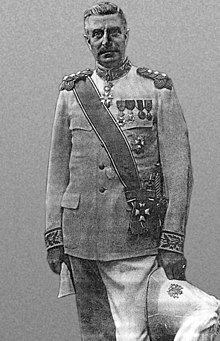Maurice Lippens (governor)
| Maurice Lippens | |
|---|---|
 |
|
| President of the Senate | |
|
In office 13 November 1934 – 1 July 1936 |
|
| Preceded by | Emile Digneffe |
| Succeeded by | Romain Moyersoen |
| Governor-General of the Belgian Congo | |
|
In office 30 January 1921 – 24 January 1923 |
|
| Preceded by | Eugène Henry |
| Succeeded by | Martin Rutten |
| Provincial governor of East Flanders | |
|
In office 1919–1921 |
|
| Preceded by | Raymond de Kerchove d'Exaerde |
| Succeeded by | André de Kerchove de Denterghem |
| Personal details | |
| Born |
21 August 1875 Ghent, Belgium |
| Died | 12 July 1956 (aged 80) Brussels, Belgium |
| Nationality | Belgium |
| Political party | Liberal Party |
Maurice Auguste Lippens (1875–1956) was a notable Belgian businessman, politician, and colonial civil servant and lawyer.
Born into an influential Liberal family, Lippens practiced as a lawyer before entering local politics in his native province of East Flanders. His business interests included a number of colonial companies. After serving as governor of East Flanders (1919–21), Lippens was recruited to serve as Governor-General of the Belgian Congo (1921–23) in which capacity he launched a major administrative reform. After resigning from the post following disagreement with the colonial administration in Belgium, Lippens returned to his business career and re-entered Belgian politics. After serving in a number of ministerial position, his political career culminated in an appointment as President of the Senate (1934–36). He returned to his business career after resigning from politics in 1936, retiring form business also in 1952. He died in 1956.
Maurice Lippens was born in Ghent, Belgium in 1875 to a prominent local family. His father, Hippolyte Lippens, had been Mayor of Ghent (1882–95) and a politician in the Liberal Party, serving as a member of the Chamber of Representatives and Senate (1882-1906). His mother came from the aristocratic de Kerchove de Denterghem family. He gained a doctorate in Law from the University of Ghent and practiced as a lawyer in Ghent.
In 1904, Rutten became a provincial councillor for East Flanders and, in 1906, was elected mayor of the municipality of Moerbeke-Waas. In 1907, Maurice joined the administrative board of the Compagnie du Congo pour le Commerce et l'Industrie (CCCI) replacing his deceased father. During the German occupation of Belgium in World War I, Lippens was involved in resistance and was held as a prisoner from 1915–18. In 1919, he was appointed governor of East Flanders where he reorganised the education and health provisions of the province.
...
Wikipedia
